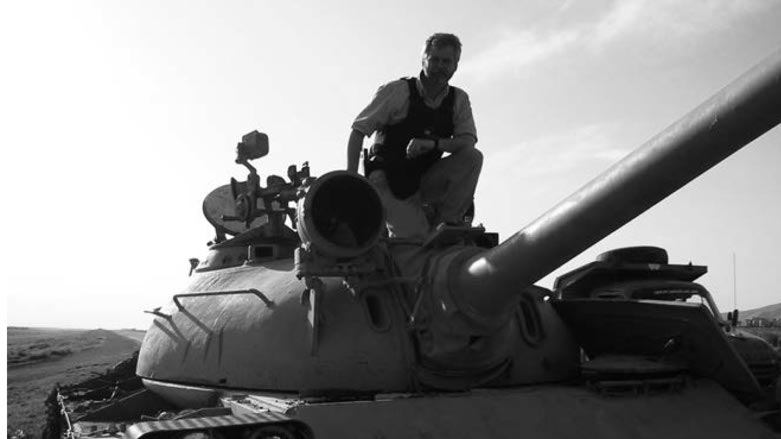US success in Iraq not possible without Kurds: Former CIA officer
"They were the only guys who we can really count on to show up here. Who are always going to be there and put their lives on the line."

ERBIL (Kurdistan 24) – Former CIA officer Sam Faddis, who led a team in 2002 to prepare for the overthrow of Iraqi dictator Saddam Hussein, and wrote a book, The CIA War in Kurdistan: The Untold Story of the Northern Front in the Iraq War, about that experience, said overthrowing Saddam wouldn't have been possible without the help of the Kurds.
Read More: The CIA War In Kurdistan: The Untold Story Of The Northern Front In The Iraq War
"It is great to say that this group of Americans achieved amazing things, which I think they did; but without the support of the KDP (Kurdistan Democratic Party), the PUK (Patriotic Union of Kurdistan) and the Peshmerga, and so forth, none of that would have been possible," Faddis told Kurdistan 24.
"They were the only guys who we can really count on to show up here. Who are always going to be there and put their lives on the line," he said. "I took my team in and out and fortunately didn't lose a man or a woman. I cannot say that none of those Kurds who worked with us died because a number of them did die working with us. That did not deter them in the least. Somebody else took their place."
The Kurdish leadership did not immediately trust the CIA plans to undermine Saddam Hussein. The Kurds of Iraq have a history of being repeatedly betrayed by Washington, such as in 1975 when the US ended its covert support for the Kurdish uprising after Iran and Iraq signed the Algiers Agreement.
The withdrawal of US forces from Afghanistan in August also raised fears among Kurdish and Iraqi parties who want the US-led coalition to stay in Iraq. The Biden administration has repeatedly stressed that Iraq and Syria are different from Afghanistan and that the US has no plans to withdraw from them.
"There was a lot of concern, and very justified concern, on the part of the Kurdish leadership during this time frame," Faddis said.
The Kurds he said, feared the Americans would do what they did multiple times before, which is come into the region "and make a lot of noise and then walk away again" leaivng the Kurds "face to face with the monster" that had killed them in their thousands before.
Therefore, Faddis had difficult conversations with the Kurdish leadership.
"They were one thousand percent justified, their concerns and it is very much to their credit that they had the guts to stick with us," he said.
Faddis also contends that the US decision to overthrow Saddam had nothing to do with the status of Saddam's weapons of mass destruction programs.
"The decision had been made that Saddam and his regime are a threat to the stability in the Middle East; we are getting rid of him once and for all," he recalled.
However, he added that this was not to say "that Saddam's weapons of mass destruction programs were not a matter of concern, they certainly were, and they were a target for us to collect on."
Faddis remains critical of US policymaking decisions in Iraq after Saddam was toppled.
"If we had made the right policy decisions following the fall of Baghdad, we would have been in a position to have walked out with an almost bloodless victory leaving a stable Iraq and having gotten rid of a monster – nothing but success," he said.
He is especially critical of the decision to disband the Iraqi army and use tens of thousands of American troops in Iraq instead of using a much smaller US force to support local allied forces.
In his book, Faddis describes, how the White House in 2002 wanted the CIA to collect intelligence that linked the jihadist groups Ansar al-Islam and Al Qaeda to Saddam as a pretext to start the war.
In the beginning, the CIA team mostly focused on Ansar al-Islam.
"So, I spent a tremendous amount of time down in PUK territory with all the Talabanis," Faddis said.
But later, the focus changed more towards undermining the Baath regime.
"After the summer of '02, I spent essentially all my time up in the KDP region," Faddis said. "I wouldn't say that Masrour (Barzani) was necessarily my number one daily contact because obviously, he had a number of people working for him with whom we would be involved on a working level. But I am sure that I saw him several times a week at a minimum."
Faddis says he still has contact with Masrour Barzani, now the prime minister of the Kurdistan Region, although he hasn't seen him in many years.
Now Faddis is a retired CIA officer and lives in the United States. He hasn't visited the Kurdistan Region since he left in 2003.
Faddis hopes that he can revisit the autonomous region someday.
"We were actually having some discussions about going back and maybe doing a documentary about the team based on the book and filming it in Kurdistan," he said. "We will see if that project moves forward."